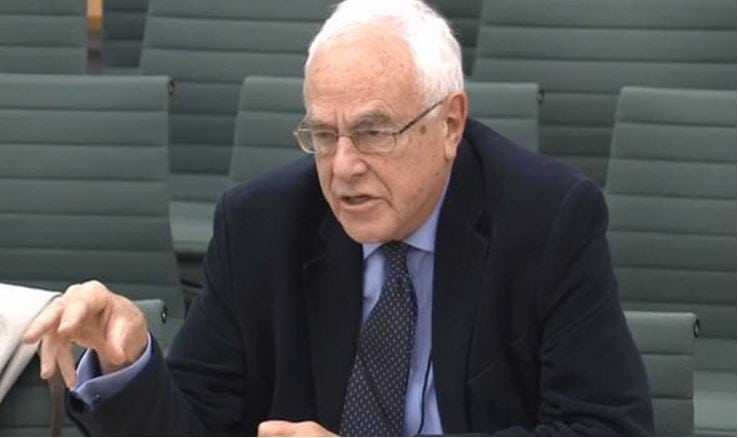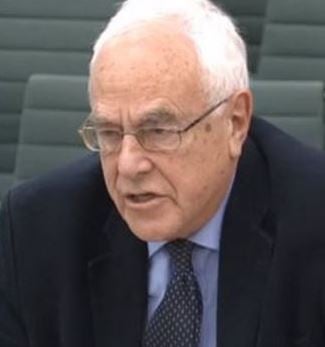Cutting migrant worker benefits will not stop them coming to the United Kingdom, said renowned economist Sir Stephen Nickell, a senior member of the Office for Budget Responsibility (OBR), a non-departmental public body established by the British government to provide independent economic forecasts.
Curbing migrant’s benefits is Prime Minister David Cameron’s main European Union renegotiation demand. It was given a scornful assessment by Sir Nickel when addressing MPs (Members of Parliament).
The Prime Minister is currently trying to get other EU leaders to agree to his demand that Britain be able to refuse benefits for migrants in work for a period of four years. According to Mr. Cameron, the measure would significantly reduce the numbers of foreigners coming into the country seeking work. Sir Stephen disagrees.
 Sir Stephen believes that curbing benefits won’t do much to reduce migrant numbers.
Sir Stephen believes that curbing benefits won’t do much to reduce migrant numbers.
OBR has not yet done a study on this
Sir Stephen explained that the OBR has not yet done a detailed analysis of what would happen if migrant’s benefits were curbed, because it won’t be within the watchdog’s remit until it becomes Government policy.
When asked for his personal assessment, he told the Treasury Select Committee:
“Changing the benefit rules for EU migration so that they become more difficult to obtain – you are asking me what impact that is likely to have. In my opinion – not much.”
When asked to explain what he meant in more detail, he said he couldn’t because he had not yet investigated it.
Sir Stephen added:
“I am prepared to say that any changes to benefit rules are unlikely to have a huge impact on migration flows. But to go further and start trying to analyse the actual consequences is not within our remit.”
Sir Stephen, former Warden of Nuffield College, Oxford, and former Bank of England Monetary Policy Committee member, admitted there is substantial evidence that the “differential in job opportunities, the differential in pay, is a significant factor in migration flows – around the world.”
Reducing budget deficit impossible without migrant workers, says OBR
The OBR believes that three-quarters of a predicted 1.1 million increase in employment in the UK will come from more migrants in jobs. About 336,000 more people came into the UK from abroad last year than left the country, more than three times the Prime Minister’s target of reducing net migration to below 100,000.
The Chancellor, George Osborne, plans to eliminate the budget deficit and reach a surplus of over £10 billion by the end of this decade.
However, the OBR says this can only be met if levels of net migration continue to be high every year until 2020.
A Downing Street official spokesperson said regarding Sir Stephen’s comments:
“The Prime Minister has been clear that the proposals we have been seeking are about addressing some of the pull factors that there are for EU migrants to come to work in Britain.”
“If you look at the amount of in-work benefits they can access from day one, we think this is a pull factor that we can seek to address.”
Cameron’s hopes suffer major setback
Mr. Cameron’s hopes of securing an agreement on cutting migrant workers’ benefits suffered a major setback on Monday when Donald Tusk, president of the European Council, warned that there is “presently no consensus” among European leaders.
Mr. Tusk, a Polish politician, added today that EU leaders need to “hear more” from the Prime Minister before deciding how to proceed. They will have to overcome “substantial political differences” regarding the issue, he warned.
Mr. Tusk’s comments followed Work and Pensions Secretary Iain Duncan Smith’s claim that nearly all EU leaders privately supported the UK’s push to stop migrants ‘popping’ between countries in search for the best benefits.
Tory ministers are still hopeful that a deal on curbing in-work benefits for migrant workers for four years is achievable. Downing Street, however, announced that no deal will be agreed by the end of this year.
Stephen Parkinson, Director of the Vote Leave campaign, which aims to persuade British voters to choose to leave the European Union in a referendum that will take place by the end of 2017, said:
“The Chancellor’s own independent experts have delivered a damning verdict on the Government’s plans to try to negotiate a deal which will limit EU migration.”
“The Government is trying to manufacture a row with the EU to make its demands look more significant than they are – but the only way to get real change and to take back control is to Vote Leave.”
Video – Tusk response to Prime Minister

